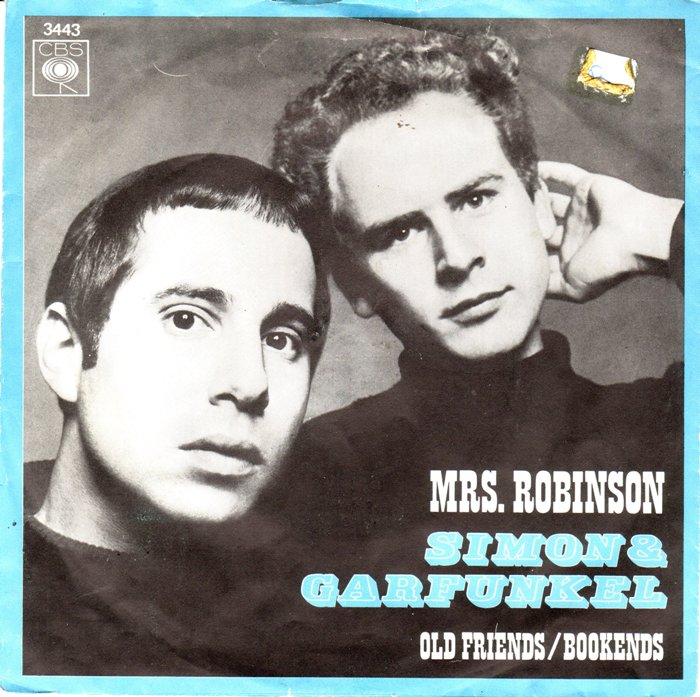June 1, 1968
- STAYED AT #1:3 Weeks
In The Number Ones, I'm reviewing every single #1 single in the history of the Billboard Hot 100, starting with the chart's beginning, in 1958, and working my way up into the present.
There's a short-lived cinematic tradition that I absolutely love: the movie end-credits song where the lyrics -- often delivered in comedy-rap style, sometimes by the stars of the movie itself -- summarize the plot of the movie you just watched. That's Will Smith's "Men In Black" and "Wild Wild West." It's Partners In Kryme's "Turtle Power." It's the parts of Bobby Brown's "On Our Own" where he's rapping. It's Dan Aykroyd and Tom Hanks' "City Of Crime," which was my favorite song in the world for a couple of months when I was nine and which, now that I think about it, may have inspired Chet Haze's entire rap career.
Simon & Garfunkel's "Mrs. Robinson" is what might have happened if a songwriter sat down to write one of those songs and then had a stroke immediately after coming up with the title. Mike Nichols' 1968 movie The Graduate, a massive generational hit, didn't really have anything about Jesus loving anyone anywhere in it. There wasn't anything about Joe DiMaggio in the movie. There's no scene in the movie where anyone goes to see the candidates debate, or where anyone has a hiding place in the pantry next to their cupcakes. If you went to see the movie after hearing the song on the radio all summer, you might've been deeply confused.
Nichols had gotten really into Simon & Garfunkel's music while making The Graduate, and he included a few of their older songs (over and over again) in the movie. But he wanted a new song from them. After some convincing, Paul Simon wrote "Punky's Dilemma" and "Overs" for the movie, but Nichols didn't like either of them. Nichols did, however, like an unfinished scrap of a song that Simon had written. Simon, who didn't even think he'd ever end up using the song, had planned to call it "Mrs. Roosevelt," thinking of it as how Eleanor Roosevelt might look at a world without heroes. But Art Garfunkel pointed out that "Roosevelt" and "Robinson" had the same number of syllables, so Mike Nichols got his song.
The version of "Mrs. Robinson" that plays during The Graduate is an unfinished sketch. Simon didn't even finish writing and recording the song until The Graduate came out and became a hit. He didn't rewrite the song for the movie at all beyond plugging the word "Robinson" in where "Roosevelt" would've gone.
The song probably remains the best-known thing that Simon has ever written. And yet almost everything about it remains beautifully half-assed. For instance: "Mrs. Robinson" won the Grammy for Record Of The Year, and it was the first even vaguely rock 'n' roll-associated song to do so. It probably could've won the Best Original Song Oscar, too, but Simon didn't even think of filing the paperwork that would've made it eligible. Instead, that honor went to "Talk To The Animals," from Dr. Doolittle.
Simon remains one of our greatest songwriters, but what he brings to the table is a sharp-eyed specificity, a willingness to get into the granular details of his own wistfulness. On "Mrs. Robinson," he doesn't do that. Instead, he tried to make vague and sweeping statements about a world without heroes, and he didn't even try that hard. Lyrically, "Mrs. Robinson" is a muddled and near-pointless song, and unlike the duo's previous #1, "The Sound Of Silence," it doesn't have the heart-stopping beauty that makes up for it. (Joe DiMaggio, who'd retired from baseball in 1951, didn't get why the song asked where he's gone. When he met Simon at a restaurant one night, he took exception to the line, but he politely accepted longtime Yankee fan Simon's explanation that DiMaggio, to him, represented a lost age of great men.)
What "Mrs. Robinson" has going for it is rhythm and hooks. The song's arrangement is lush and propulsive, with all those guitars wrapping themselves around each other and sticking to the brisk conga-led beat. Simon wrote a few lyrical nods to the Beatles; that "coo-coo-cachoo" was a blatant reference. And his harmonies with Art Garfunkel, much like the Beatles' harmonies, have a way of making nonsense sound strong and memorable. I have my suspicions that the song remains a cultural presence only because of the movie that it only barely deigns to acknowledge rather than the song itself. But the song itself? Pretty good!
GRADE: 7/10
BONUS BEATS: The Lemonheads' second-biggest hit was their 1992 cover of "Mrs. Robinson," which was all over alt-rock radio when I was in middle school. The band recorded it to help sell a 25th-anniversary edition of The Graduate, and frontman Evan Dando wasn't especially fond of it. Here's the video:
And here's the ending montage from Martin Scorsese's 2013 film The Wolf Of Wall Street (a movie I like better than The Graduate or, for that matter, Doctor Doolittle), which is set to the Lemonheads' version of "Mrs. Robinson":
THE NUMBER TWOS: Hugo Montenegro And His Orchestra's version of Ennio Morricone's theme from The Good, The Bad And The Ugly peaked at #2 behind "Mrs. Robinson." It would've been an 8. (Morricone's original, which never charted, would've been a 10.) Here it is:






